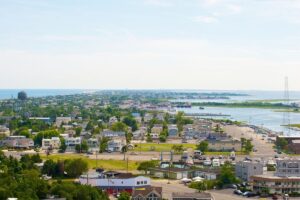Writer: Joshua Andino
 2 min read May 2022— With Memorial Day just around the corner, incoming crowds highlight the Jersey Shore’s changing economy.
2 min read May 2022— With Memorial Day just around the corner, incoming crowds highlight the Jersey Shore’s changing economy.
With the pandemic increasingly in the rearview, the lasting impact on the tourism and hospitality sectors is significant. While wages have risen across industries, the labor shortage has hit the tourism sector particularly hard and remote work opportunities have changed the dynamics of the typical busy season over the summer months. While the sector has managed thus far, the Memorial Day weekend will likely test local communities and businesses across the Shore as large crowds seem to be anxious to return.
Last weekend, Monmouth County’s Long Branch experienced a large 5,000-person party inspired by TikTok, but local businesses were forced to shut down due to unruliness, reports NJ.com. The party was promoted on social media without any permits and is part of a national trend where large crowds, spurred on by social media, descend on public spaces with little concern for the impact on the wider community, explained Public Safety Director Domingos Saldida. While the event was in many ways a negative for local small businesses, it is a symbol of the ramping return of crowds.
Experts and locals alike believe that 2022 will be a strong year for the Shore’s tourism economy, and crowds have begun to return to the hotels, casinos and communities that call the beachfront home. Businesses are hopeful that as temperatures continue to rise and summer begins in earnest, visitors will continue to return. Despite the weekend’s challenges, communities remain bullish on this year’s season, with Memorial Day weekend providing what will likely serve as a barometer for what to expect in July and the welcome return of Long Branch’s very own Oceanfest 2022.
Rising costs and labor seem to be the primary caveat that could hold back the local economy, but experts believe the last two years of pent-up demand and consumers’ desires to get out of the house will overcome any potential challenges, as local leaders mentioned over the course of the 14th Annual Jersey Shorecast, hosted by the Lloyd D. Levenson Institute of Gaming, Hospitality and Tourism, Stockton University School of Business.
While under normal circumstances large crowds might be considered a boon to local businesses, the lack of available employees and the demands placed on local communities and their businesses poses a double edged sword that could drive further change along the Shore. Changing demand, the lack of available workforce and rising costs are shifting the traditional summer busy season, with some communities aiming to develop a more stable and year-long tourism industry. Corinne Trainor, president of the Jersey Shore Chamber of Commerce told Invest: in an interview that labor remains the key issue facing businesses. “The labor shortage at the Jersey Shore has been severe,” said Trainor. “Business owners tell me they are working longer days than they ever have before, often compromising their own health to keep their businesses open.”
Trainor noted that the labor issue was highlighted in low-wage jobs, with increased wages and the lack of seasonal and teenaged workers posing an issue. “Subsidies have been rolled back and Jersey Shore businesses still have not been able to fill all open positions, specifically for job positions earning between minimum wage and $20 an hour,” said Trainor. “It’s difficult to imagine a quick workforce recovery, especially at the Jersey Shore, without heavy participation of college and high-school students. Unfortunately, businesses cannot rely on workers who are only home for June through mid-August.”
Further south in Ocean County, Tony Vaz, mayor of Seaside Heights Borough, noted in a conversation with Invest: that as a result of pandemic changes, particularly labor and remote work opportunities, the community would aim to develop a year-long clientele as opposed to its pre-pandemic seasonal model. Redevelopment opportunities were also a factor driving the popular Shore community to diversify its economy. “I visualize the mixed use of our communities, particularly on our boulevard, to be an attraction for year-round tourism. There are opportunities but what we need is for businesses to be open year-round so people can come,” said Vaz.

